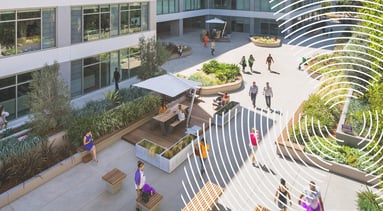.jpg?width=1600&height=933&name=ebw2%20(2).jpg)
From now on, whether employees come into the office occasionally or regularly, it will need to be for a specific purpose. That purpose will involve curated experiences which deliver real value for both them and the business.
With around 80-90% of employees likely to want to remain working from home at least one day a week, when and why they come into the office will have to be managed carefully between them and their employer.
Why go to the office in a time of COVID?
Employees have discovered they’re mostly comfortable and productive when working from home; they’re saving money and avoiding the commute. So being asked to go to the office must be for reasons which make sense to the employee – especially if they’re worried about safety. Why ask someone to come in every Tuesday if it’s just to show their face? Or to work mostly alone for eight hours and then go home because it’s 5:30?
The reasons why employees come to the office could tip the balance between feelings of anxiety, resentment and irritation or feelings of anticipation, worth and enjoyment. Even those coming in for good reason will feel frustrated if the colleagues, spaces and equipment they need aren’t available or easy to find.
In response to concerns like this, Unispace has developed Propeller, our new future office strategy. It addresses a blended workplace (office + remote) and the issue of when and why people will come to the office. Having been solid advocates for ABW for some time, we’re now evolving ABW into EBW, or ‘experience-based working’.
What is the office for?
Some aspects of work are difficult or almost impossible to achieve from remote locations like home. So Propeller suggests that the office will remain an essential component of the workplace for experiences such as:
- Community (45% of the time, on average)
- Problem-solving (25%)
- Innovation (30%)
Our predictive analytics can show you how these percentages may differ for your own business, but they’ll also vary by industry. Sectors where problem-solving is dominant include financial, legal and the public sector. Innovation will be foremost in tech, pharma, and manufacturing, while community will be the preference in the creative industries and insurance.
This indicates that a company’s future office strategy needs to adapt to the specific balance of experiences their employees need to have.
Why might you move away from ABW?
Based on the altered importance of the office and the shift in focus towards problem-solving, innovation and community, here’s how ABW evolves into EBW:
|
Activity-based working (ABW) |
|
|
Experience-based working (EBW) |
|
What does EBW look like?
- For problem-solving there may be libraries, side-by-side tables, mega-tables, and VR/AR spaces
- For innovation there may be theatres, flexi-rooms, huddle spaces, maker labs, think caves and immersion rooms.
- For community there may be bleachers, a town hall space, games rooms, café spaces, vegetable gardens, customer experience centres, BBQ pits and a brand zone
What EBW means for employees
Across these three types of experience, there is now greater understanding that the individual is there to make something happen (problem-solving, innovation or an expression of community) rather than simply to be there. People come into the office specifically to have that experience; once they’ve done it, they’re free to return to working more remotely.
This puts a strong focus on delivering output for the business during that time, whether that’s idea-generation, decision-making, team-building, or maintaining the company culture.
Why not get in touch and start a conversation about Propeller? And check back next week for our article on destination workplaces in response to coronavirus.


